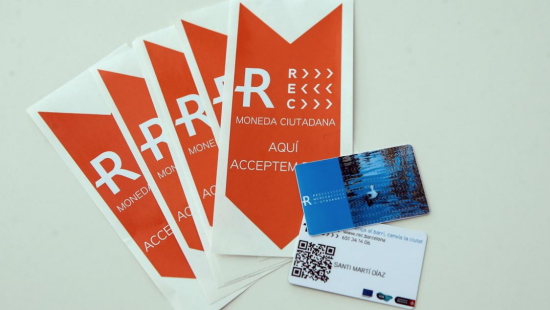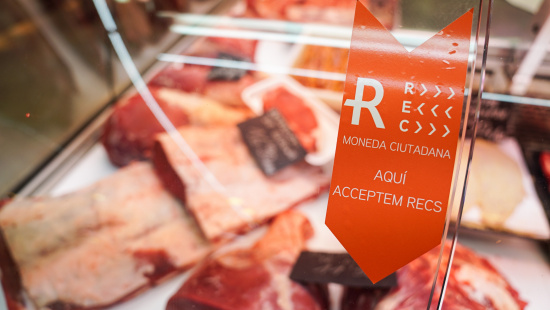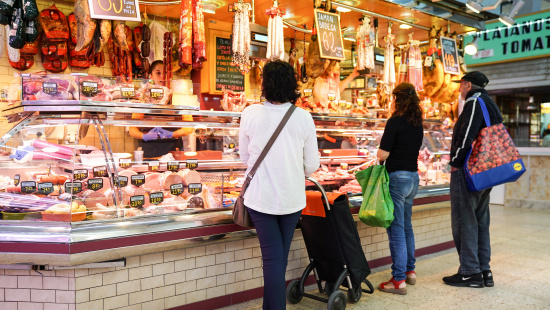The REC currency is launched in the Besòs hub to boost commerce
When
03/07/2018
This October, the REC currency (short for Recurs Econòmic Ciutadà, or Citizen's Economic Resource) has been launched in 10 different neighbourhoods of the Besòs hub, as part of a pilot project and also a more extensive EU project to promote local, independent and rooted commerce. It is an exchange system for citizens that is complementary and equal to the euro that enables payments to be made between the mobile phones of customers and commercial establishments instantly, easily and at no extra cost.
Eighty-eight shops and market stalls are taking part in this experience, the first that have signed up to accept payment in RECs. Anybody that wishes to can redeem euros for RECs and use them in the commercial establishments of the Besòs hub that accept them, available on the map of the REC website and also on the mobile app.
The REC helps to ensure that the money stays within the same region, with the intention of developing the local economy, commerce and relationships, and that this money is spent in the neighbourhoods, in their shops and commercial establishments. With this measure, the aim is to contribute to the region’s economic and commercial vitality, to promote local, independent and rooted small commerce, while at the same time avoiding commercial abandonment of the streets.
The first shops and market stalls have signed up.
As regards the establishments that accept payment in RECs, the first eighty-six shops and municipal market stalls have signed up with the involvement of the commercial associations and the three corresponding districts. That means that there is an average of 8-10 neighbourhood shops/stalls that have joined the network from the very beginning and that already accept the payment for goods in RECs. A pilot project that will be extended to the rest of the local commerce establishments of the ten neighbourhoods that form the Besòs hub.
The commercial associations and markets have taken on an important role in the launch of the REC to ensure the basic needs that need to be covered with the payment of 25% of the Municipal Inclusion Support in RECs.
Specifically, this involves the commercial entities of the Zona Nord (Ciutat Meridiana, Vallbona, Torre Baró), Roquetes and Trinitat Nova in the district of Nou Barris; Trinitat Vella, Baró de Viver and Bon Pastor in the district of Sant Andreu, and those of the neighbourhoods of Verneda-La Pau and Besòs-Maresme, in Sant Martí. An area of over 100,000 inhabitants, about 7% of the total of the city, and with earnings far below the average.
Digital currency
The REC is a digital currency, based on blockchain technology, which is used to make payments via a mobile phone app instantly, easily and at no extra cost. In order to join the REC network you simply download the ‘REC Barcelona’ app from Google Play and sign up as a user, private individual or professional.
RECs can be spent at any establishment or entity that accepts them. In addition, shops and entities will also be able to make purchases in their neighbourhoods and provide advantages, offers and promotions to gain customer loyalty. That way, use of the REC will continue to expand, with ever-increasing benefits for neighbourhoods.
The REC is created through the B-MINCOME project
The REC is created through B-MINCOME, a much more extensive urban and social innovation pilot project that is already under way and which is supported economically by the European Union. Last December, 950 households (with a total of 3,761 people) from 10 different neighbourhoods in the Besòs hub began to receive Municipal Inclusion Support (SMI) in a project co-funded by the European Union with the aim of verifying up to what point the introduction of guaranteed and universal minimum income might be useful to reduce the indicators of poverty and to revitalise specific areas of the city both socially and economically. Now, 315 of these users (one out of every three families) receive 25% of this support in RECs every month to evaluate what impact their basic needs shopping has on local commerce.
The first payment of 25% of the Municipal Inclusion Support (SMI) has already been made in RECs to the 315 users of the B-MINCOME project and they have been instructed on how to use the REC app. This means a total of €42,590.39 RECs will start to circulate this month in 10 neighbourhoods of the Besòs hub.
The First Deputy Mayor, Gerardo Pisarello, said that ‘together with commercial and local entities, we are launching a very innovative measure, a citizen's currency, which is complementary to the euro, which is a fundamental tool to boost local commerce, to achieve customer loyalty for local commerce and to avoid neighbourhood abandonment, as well as ensuring that the money spent by local people doesn’t only go to large supermarkets or online stores’.
You can find more information about the citizen's currency at www.rec.barcelona.




